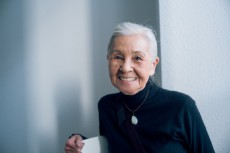『サムライマラソン』 衣装デザイナー ワダエミ インタビュー/Interview with Emi Wada about “SAMURAI MARATHON”
NeoL / 2019年2月21日 18時0分
1855年、現在の群馬県安中市にあった安中藩の主が藩士を鍛えるために開催した「安政遠足(あんせいとおあし)」は、日本史上初のマラソン大会と言われている。2月22日に全国公開される映画『サムライマラソン』は、この史実を題材にした土橋章宏の小説「幕末まらそん侍」を原作に、イギリス人のバーナード・ローズ監督をはじめ国内外の才能豊かなクリエイターが集結して完成した時代劇だ。衣装を手がけたのは、黒澤明監督の『乱』(1985)でアカデミー賞衣装デザイン賞を受賞したワダエミ。六十年のキャリアを培い今もなお世界中で活躍する彼女に、本作の魅力や衣装デザインの秘話などをうかがった。(⇨In English)
——本作は幕末の日本を舞台にした時代劇ですが、イギリス出身のバーナード・ローズ監督をはじめ、国際的なスタッフが参加されています。衣装については、どのように話し合って決められたのですか?
ワダエミ「バーナードの作品はずっと観てきたし、彼も私が手がけた映画を観てくれていたという関係があるので、とてもやりやすかったです。今の日本の時代劇というとNHKの大河みたいなイメージがあるかもしれませんが、バーナードは無声映画や活劇に惹かれていました。安中藩は貧乏な藩だから、襟元がきちっとしているかどうかとか、それぞれのキャラクターで見せていこうと思いました」
——事前にはどのようなリサーチをされましたか?
ワダエミ「最初は原作の『幕末まらそん侍』を読みました。私の母校の同志社(女子中学校・高等学校)では、創設者の新島襄のストーリーから勉強するんですが、安中藩は新島先生のいらした藩で、彼は脱藩、脱国してアメリカに行ってしまう。そんなことをふと思い出したりして」
——10代の頃の記憶がよみがえってきたんですね。
ワダエミ「そうなんです。たまたま近所の本屋が店を閉じることになって、店主が『どの本でも持って行ってください』と言ってくれた時、棚に『新島襄の生涯』っていう本があった。中高の教科書で習ったんですが、その本で詳しく知ることができたんですね。そんなことがちょうど『幕末まらそん侍』を読んで間もない頃に続いたので、これは何かのご縁であると。同志社で学ばせていただいたことの恩返しの一つになるかな、という気持ちもありました」
——それはうれしいご縁ですね。
ワダエミ「そうなんですよね。本を読むと、新島襄という方は、いろんなお金持ちから寄付を募って、それで今の同志社を作った。女子に教育をという彼の志の一つは、今のアフリカで叫ばれているのと同じようなことですよね。本作での雪姫の描き方についてですけど、原作と同じだと旧態依然とした男社会に不満を持つ世界中の女からブーイングが来るよ、とバーナードに話しました」
——雪姫は暴漢に襲われても黙っていないし、観ていて気持ちよかったです。
ワダエミ「あと、当初は女性たちの弓とか薙刀部隊として侍女たちが立ち上がる場面もあったんだけど、上映時間の関係もあって(カットされて)。幕末といえどもやっぱり女性たちは、今の視点から見ればこうあってほしい、というのはありました。これはぜひ女性に観てほしい映画です」
——担当する作品では必ずすべての登場人物の衣装を手がけるそうですが、本作はものすごい人数が登場しますよね。
ワダエミ「今回だけに限らず、いつも大変なんです(笑)。でも、その大変なことをクリアしたというのは一つの喜びでもあるし、また次の仕事につながっていくわけです」
——衣装プランは素材や染めからも考えられるそうですが、全体でどれくらいの時間を費やされたのでしょうか?
ワダエミ「今回は本当に準備時間が短かったのと、ちょうど伸び盛りの若い役者さんたちがたくさん出ていてそれぞれに忙しいこともあって、限られた隙間で衣装合わせなどを行いました。約4ヶ月です」
——それぞれのキャラクターの衣装の色味や襟元の色の組み合わせなど、とても美しくて夢中で拝見させていただきました。特にこだわった点はありますか?
ワダエミ「時代考証的な一つの決まりっていうのも、少しは取り入れてます。でも、そればかりだとつまらないし、最近見掛けるようなスタイリッシュなサムライ映画のようにもしたくない。むしろずっと人間的な匂いが印象付けられるよう意識していました。本作は群像ドラマだから、何よりも役者の力で持っていってほしい、と思って」
——そもそも、ワダさんはなぜ衣装デザイナーを始められたのですか?
ワダエミ「私は衣装のデザイナーになろうと思ったわけではなく、同志社の後に芸大(京都市立美術大学 西洋画科)に進んだので、画家になるつもりだったんです。在学中に結婚したんだけど夫の和田勉(元NHKドラマ部チーフディレクター。故人)が舞台の演出をやる時に、『予算がないから、あなたやってみたら?』と、たまたま言われて、舞台美術と衣装の両方を手がけました。私は二十歳で大学三年生でした。当時は衣装といえば松竹衣裳さんや東宝衣裳さん(現・東宝コスチューム)とかから借りるもので、衣装のデザイナーという仕事はなかったわけ。その頃はメリヤスを使ったりして、非常にポエティックな作品だったんですけど、やってみたら、それを見た方から次の仕事が来て。そんな風に二十歳から今の歳まで、切れ間なく続いています」
——当時は今よりも働く女性が少なかったと思いますが、苦労も多かったのではないでしょうか?
ワダエミ「あまり苦労はしていないの(笑)。やはり、今までにないものを作ろうっていう、そういう気持ちでずっとやって来ましたから。いつの間にかオペラも手がけるようになって、フランコ・ゼッフィレッリの『マダム・バタフライ』と『トゥーランドット』は今もヴェローナ(アレーナ・ディ・ヴェローナ音楽祭)で上演されていますし、これまでにメトロポリタン・オペラ、ネザーランド・オペラでも作りました(笑)。少し前ですが北京の演出家・李六乙がロイヤル・シェイクスピア・シアターと協働した際に声を掛けてくれて、演劇『キング・リア』に参加しました。この作品も、北京の国立劇場とストラトフォードのシェイクスピア劇場の両方で、毎年上演されているようです」
——世界中でご活躍されているのですね。
ワダエミ「三年ほど前にどうしてもと頼まれて、上海の若い世代のプロダクションが手がけるネットドラマに参加してみたの。『将軍在上』という六十話のドラマなんだけど、メインランド(中国本土)と香港、台湾に続いて、アメリカでも配信されたって。日本の場合は先日までBSチャンネルで(放題『花と将軍』)放送されたんだけど、そうしたら近所の主婦の方が毎日観ていて、はまっちゃいました、って(笑)。こんなネット時代が始まっているんだから、『サムライマラソン』が注目される機会もずっと増えて欲しいですね」
——ネット時代といえば、ワダさんが黒澤明監督の『乱』(1985)でアカデミー賞衣装デザイン賞を受賞した際のスピーチをネットで拝見しました。
ワダエミ「賞をもらおうと思ってやった仕事は何もないんですよ。小澤征爾さんとやった『エディプス王』でエミー賞をいただいた時も、私はアムステルダムでオペラをやっていたんです。プロデューサーのピーター・ゲルブから電話がかかってきて、『とりあえずノミネートされたから、すぐにロスへ行ってほしい』というので、行ったらそれもいただいちゃって」
——アカデミー賞は受賞された後、ずっと会員でいらっしゃるんですか?
ワダエミ「三十三年目になりました。授賞式も毎年観に行っていて、これはもうホリデーとして行くことにしています。母が亡くなった時と和田勉が亡くなった時以外は出席しています」
——ハリウッドでは近年「#metoo」ムーブメントが起こっていますが、長年お仕事をされてきて、そのような状況に直面したことはありますか?
ワダエミ「私の場合はないけども、#metooという声が運動としてあれだけ広がったのだから、ハリウッド映画の製作舞台裏の一部では、力関係と共に隠されてきた暴力が、やっぱりあるだろうと思います。私は最初の映画が『Marco』(1972)っていうハリウッド映画でしたが、その時にユニオン(組合)に入って以来メンバーなんです。会費を払うと、アメリカのユニオンは毎年それを全部投資していて、辞める時は退職金が出るんですよ。それに毎年利息が来て、ちょうどホテル代くらいになるんです(笑)」
——このお仕事を六十年間も続けられてきたわけですが、作品を選ぶときの基準はありますか?
ワダエミ「中国は広いし人も多いでしょ。ヒットした『HERO』(2003)は一日で制作費を回収したの。それで初日に上映された人民大会堂でチャン・イーモウ監督が走ってきて、『次もやってほしい』って。その次の金城武が出演した『LOVERS』(2004)もヒットした。時々ヒットする作品があったりもするけれど、だけどすごくアーティスティックな映画とか小さな作品も、脚本を読んで面白そうであればもちろん引き受けます」
——ずっとフリーで活動されているそうですが、最近はどのような態勢でお仕事されていますか?
ワダエミ「六十年ほどの間にいろんな人たちといろんなやり方をしてきましたけど、今はほとんどの仕事が、北京のアトリエで手伝ってくれるスタッフとの協働が多いですね。日本でしか手に入らない生地を使いたいって時は京都だったりもちろん自分で探しに回りますけど、出演者全般に渡って重複する生地やそのヴァリエーションといった、生地や装飾パーツの絶対量がまとまって必要となる場合は、予算に収めることができたり、カッターや刺繡などの技術者がまとまっている北京のアトリエで専門家に相談した方が、解決できやすいんです。どんな生地をどの店でリサーチするかっていうことも、北京のスタッフに相談して現地で足を運ぶことで、また新しいアイデアが浮かんだりするのね。選択肢や規模、予算の抑え方、調達力なんかが、日本でとはかなり違うんですね。国内外でのそうした蓄積とともに私の歳になると、日本でのアシスタントができることや動ける範囲がなかなか難しくなってきた。とはいえ、今回の『サムライマラソン』のように、日本の小さな藩が舞台の場合は、アプローチや態勢もまた別です。勅使河原宏さんとやった『利休』(1989)の時に大変お世話になった松竹衣裳の重鎮がいらっしゃって、その直系である飯塚さんにはもう長い間、ことあるごとに助けてもらってきました。飯塚さんをはじめとする松竹衣裳の優れたスタッフが、私のデザインやプランと同等以上に、今回の映画の衣装づくりに参加してくれています」
——北京にアトリエがあるんですか?
ワダエミ「そうなの。黄宝荣という方の工房で、彼とは『HERO』の時に出会いました。彼の工房は『HERO』をきっかけにどんどん大きくなって、それで今でも、私のためにできる限りの態勢を整えてくれるんです。
先ほど少し触れた『将軍在上』は六十話で五千着くらいの衣装が必要。その上、毎週のように次回の台本が送られて来るようなテンポだから、どうしようってことになって。すると工房でいつも一緒のメインリーダーが、北京の中央美術学校に通う、パソコンで絵が描けるアシスタントを二十五人、用意してくれたの。私がオリジナルを描いて、登場人物ごとにそれぞれ担当してもらって、そのヴァリエーションを描いてもらうんです。二階のアシスタント部屋で描かれたものは、試作衣装を一堂に並べてある階下にいる私が、すぐにチェックできる。それぞれどういう絵が得意かを見て、直しを出しながら登場人物ごとに振り分けていく。アシスタントたちはみんな二十歳前後で、そのくらいの歳でないと、パソコンでだってこんなテンポにはならないのよ。私だったらデザイン上がりまで手描きの方が絶対に早いんだけど、毎週送られて来る台本を読みながら同時に何十枚もなんて、とても描けないから(笑)」
——今後のご予定を教えていただけますか。
ワダエミ「『サムライマラソン』を終えた後、これも不思議なことに邦画の仕事が続きまして、オダギリジョー監督の『ある船頭の話』に参加しました。九月に公開予定です。いまは香港の女性監督の仕事に参加しています。内容はまだ話せませんが、これは日本の方にも、ぜひ観てほしい映画になりますよ」
photography Kisshomaru Shimamura
text Nao Machida
edit Ryoko Kuwahara
『サムライマラソン』
2月22日(金)全国ロードショー
https://gaga.ne.jp/SAMURAIMARATHON/
出演:佐藤健 小松菜奈 森山未來 染谷将太
青木崇高 木幡竜 小関裕太 深水元基 カトウシンスケ 岩永ジョーイ 若林瑠海/竹中直人
筒井真理子 門脇麦 阿部純子 奈緒 中川大志 and ダニー・ヒューストン
豊川悦司 長谷川博己
監督:バーナード・ローズ
原作:土橋章宏「幕末まらそん侍」(ハルキ文庫) 脚本:斉藤ひろし バーナード・ローズ 山岸きくみ
企画・プロデュース:ジェレミー・トーマス 中沢敏明 音楽:フィリップ・グラス 衣装デザイン:ワダエミ 配給:ギャガ
©”SAMURAI MARATHON 1855”FILM Partners
ワダエミ
衣装デザイナー
第58回アカデミー賞 最優秀衣装デザイン賞受賞 『乱』
第45回エミー賞 最優秀衣装デザイン賞受賞 『オイディプス王』
第13回香港電影金像奨 最優秀衣装デザイン賞受賞 『白髪魔女伝』
第17回香港電影金像奨 最優秀衣装デザイン賞受賞 『宗家の三姉妹』
第22回香港電影金像奨 最優秀衣装デザイン賞受賞 『HERO』
(Available in English)
In 1855, the Ansei Toashi Samurai Marathon was lead by many people in Annaka city in the current Gunjima prefecture to encourage military and literary arts - It is said to be the first marathon ever to take place in Japan. The film Samurai Marathon, with its expected release on February 22nd, is a historical drama based on Akihiro Dobashi’s novel Bakumatsu Marathon Samurai completed by a group of talented creators from in and out of Japan, including Director Bernard Rose from the United Kingdom. Emi Wada, who won the Oscar for costume design for Ran (1985) at the Academy Awards, was the one in charge of costume design. In honor of 60 years of her career, we asked Emi, who continues and will continue to succeed all over the world, about the fascinations in this work and her secrets behind costume design.
--This historical piece is set in Japan in its final years of the Edo period known as Bakumatsu. Several intercultural staff members such as Director Bernard Rose from England have participated in the makings. How did you discuss and decide on the costumes?
Emi: “I have always seen Bernard’s works, and we had a relationship where he would watch the films I participated in also, so it was a very smooth process. When you think of historical dramas today, there is a typical image like the NHK Taiga dramas, but it’s not a set prototype like that. First of all, the Annaka Han (domain) was a poor domain so I decided to express that through each of the characters, through details such as whether their collars were structured or not.”
--What kind of research did you conduct beforehand?
Emi: “I first read the original novel, Bakumatsu Marathon Samurai. At Doshisha High School where I graduated, we first study the story of Joseph Hardy Neesima. The Annaka Han was where Professor Neesima belonged, but he escaped the domain and became independent and went to America. That popped into my mind all of a sudden.”
--Your memory from your teenage years came back to you.
Emi: “That’s right. It just so happened that a bookstore near me was closing, so the owner told me “bring home whatever books you want”, and among those books was one called Joseph Neesima’s Shogai (Career). I had studied him in school from a textbook, but by reading that book I gained a more detailed perspective. It was around the same time Bakumatsu Marathon Samurai came out, so I thought it was somewhat meant to be. I also thought it would be a way for me to give back to my years studying at Doshisha.”
--That sounds like wonderful fate.
Emi: “Yeah. When you read about Joseph Neesima in books, he sounds like he had been collecting donations from many wealthy people, but that’s how he built the Doshisha that exists today. Education for females was the equivalent of what it is to people in Africa today. In the film, I told Bernard that if Yukihime is written as the same as the original novel, women from all over the world would criticize him.”
--Yukihime was not quiet even when the thugs assaulted her, so it was empowering to watch.
Emi: “There were also bows and swords for the women, but there were issues about the length of the film and we didn’t include them. Although it’s the Bakumatsu era, I had a desire to showcase the women as women of today. I would definitely recommend this film to women.”
--I heard that for the films you participate in, you oversee all of the characters’ costumes. This one had many characters, right?
Emi: “Not just for this film, but it’s always a lot of work haha. Getting through the tough work is also rewarding, and leads me to my next job.”
--You also construct the costumes from the fabric and dying process to its final piece. How much time did you put into them?
Emi: “This time there was the fact that there was barely any time to prepare, and the Japanese actors/actresses were very busy so we did fittings when we found some spare time within that.”
--I was immersed in the colors of each of the character’s collars and the overall color palettes. Was there anything in particular you stuck to?
Emi: “I actually incorporate some of the structures characteristic of that era. However, if I do too much of that it turns into an NHK Taiga Drama. I didn’t want it to be like any of the samurai films that are also out, so I focused more on the human aspects. The film is a drama about a group of people, so from there I wanted the actors/actresses to turn it into something.”
--Why did you begin costume design in the first place?
Emi: “It wasn’t like I intended to become a costume designer. After I graduated Doshisha High School, I went to Kyoto City University of arts so I was planning to become a painter. Then, Ben Wada was producing and came to me saying, “We don’t have much of a budget, why don’t you give it a shot?”, and I had the chance to help with the set and costumes. I was 20 and in my third year of college. The costumes at the time were borrowed from Shochiku Costumes or Toho Costumes, and there were no jobs as a ‘costume designer’. The knitted fabrics from then made it a very poetic piece, but after doing that, someone who had seen it gave me another job. Next thing I know, I’ve been at it non-stop from my 20s to 82.”
--There must have been less women who worked back then. Perhaps there were lots of difficulties with that?
Emi: “I haven’t been through too many difficulties, haha, because I’ve been doing this thinking to create something new that had not existed before. That’s how I came to work on operas too. In 2018 I did Franco Zeffirelli’s Madame Butterfly and Turandot at the Arena di Verona Festival, and in the past I’ve worked for the Metropolitan Opera, the Dutch National Opera, and checked them all off, haha. I also design for a collaboration with Royal Shakespeare Company in King Lear. They’re both the same designs at the National Centre for the Performing Arts in China and the Shakespeare Theater in Stratford. I do that every year.”
--You really work all over the world.
Emi: “Because we have entered the internet era, it’s become so much easier for anybody to watch old works. There was an online drama series called “Oh My General” composed of 60 episodes that I did 3 years ago, and it began in mainland China and Hong Kong, Taiwan, then spread to the U.S. and now it’s even streaming on the BS channel in Japan. This couple who were my neighbors told me they watch it every day, and that they’re so into it! Haha. I would like Samurai Marathon to also take advantage of the internet era and gain attention.”
--Speaking of the internet, I saw your award acceptance speech online when you received the Academy Award for best costume design for Akira Kurosawa’s Ran (1985).
Emi: “I have never done a job thinking I would get an award. When I received the Emmy Award for Oedipus Rex that I worked on with Seiji Ozawa, I was working on an Opera in Amsterdam. I received a call from a producer named Peter Gelb, and he said, “You were nominated so I want you to fly to LA as soon as possible.” And I went, and ended up winning the award. Now, “Oh My General” has apparently won an award called the China TV Golden Eagle Award.”
--After you won the Academy Awards, have you always been a board member?
Emi: “It’s been 33 years now. I attend the awards ceremony every year, and I’m flying to Los Angeles this year too from the 22nd. I’ve decided that I will participate in this like a vacation now. Besides the time my mother passed away, and when Ben Wada passed away, I have always attended.”
--The #metoo movement has been big in Hollywood, but have you faced any situations like that while working recently?
Emi: “Not for me personally, but I can imagine #metoo being a part of many situations. My fist film was a Hollywood film called Marco (1972), so after joining the union then, I have always been a union member. In American unions, you pay an annual fee and invest that money, and when you leave the union you get retirement funds. I get a little bit of interest on it every year, and can use it towards hotel expenses, haha.”
--You have been doing this job for 60 years, but are there any guidelines for when you choose films to work on?
Emi: “China is big and has many people, so I collected the production cost within a day for HERO (2003). Then on the first day, Zhang Yimou from the Great Hall of the People came running to me saying “Please do the next one too.” LOVERS (2004) with actor Takeshi Kaneshiro was also a big hit. I sometimes have films that are hits like those, but also am open to artistic films and small works if they seem interesting.”
--You seem to be working independently for a while, but in what system do you work?
Emi: “I’m not very entrepreneurial, I don’t have a desire to have people under me. I sometimes have assistants but fundamentally I follow Localism. Only the locals know which fabrics and shops are best. When you get to my age, Japanese assistants are extinct. They cannot work because of things to do with family and illnesses. So now I invite them from London to my atelier in Beijing.”
--You have an atelier in Beijing?
Emi: “Yes I do. “Oh my General”, for example, had about 5000 costumes so there was no way I could finish in time. I have 25 assistants who attend the Central Academy of Fine Arts in Beijing who are able to illustrate on the computer. I draw the originals, and have each of them assigned to a character and illustrate variations. The second floor is the assistant room, and their drawings are immediately checked in the room below. I see what drawings each of them are good at, and assign them their characters. They’re all around their 20s. If they’re not around that age, they can’t use computers. It’s much faster for me to hand draw, but there’s no way I can draw 5000, haha.”
--Can you tell me about your plans from hereon?
Emi : I have a film that Joe Odagiri is shooting which will be released on September, and then going to Beijing from January 3rd. It’s a film I highly recommend to women.”
photography Kisshomaru Shimamura
text Nao Machida
edit Ryoko Kuwahara
"Samurai Marathon"
Release: February 22
https://gaga.ne.jp/SAMURAIMARATHON/
Stars: Ken Sato, Rina Komatsu, Mirai Moriyama, Shota Sometani
Munetaka Aoki, Ryu Kohata, Yuta Koseki, Motoki Fukami, Shinsuke Kato, Joi Iwanaga, Ruka Wakabayashi/ Naoto Takenaka, Mariko Tsutsui, Muji Kadowaki, Junko Abe, Nana, Taishi Nakagawa, Danny Huston, Etsushi Toyokawa, Hiroki Hasegawa
Director: Bernard Rose
Based on the original novel by Akihiro Dobashi, Bakumatsu Marathon Samurai (Published by Haruki Bunko)
Script: Hiroshi Saito, Bernard Rose, Kikumi Yamagishi
Produced by: Jeremy Thomas, Toshiaki Nakazawa
Music: Philip Glass
Costume Design: Emi Wada
Distribution: GAGA
©”SAMURAI MARATHON 1855”FILM Partners
Emi Wada
Costume Designer
"Ran" wins Best Costume Design: 1986 Oscars" At the 58th Annual Academy Awards
"Oedipus Rex" wins Outstanding Costumes : At the 45th Emmy Award
"The Bride with White Hair" wins Best Costume Design: At the 13rd Hong Kong Academy Award
"The Soong Sisters" wins Best Costume Design: At the 17th Hong Kong Academy Award
"HERO" wins Best Costume Design: At the 22nd Hong Kong Academy Award
関連記事のまとめはこちら
http://www.neol.jp/art-2/
この記事に関連するニュース
-
「私たちを人間として扱ってほしい」やまぬ爆撃、家族との別れ…ガザ脱出の友人を探し記者がエジプトへ「戻りたいけど誰も戻れない」【脱出者が語る惨状】
北海道放送 / 2025年1月18日 9時45分
-
旅行者はGoogleを活用し続けつつ、AI生成のソーシャルメディアコンテンツにも肯定的
PR TIMES / 2025年1月14日 10時45分
-
この英語ってどんな意味?「 plot twist 」
OTONA SALONE / 2025年1月11日 7時0分
-
英語で「それは大変だったね」はなんて言う?
OTONA SALONE / 2025年1月9日 7時0分
-
tHE GALLERY HARAJUKUにて、2025年1月2日(木)より、THEKLA KAISCHAURI個展「FRACTURED」を開催。
PR TIMES / 2024年12月25日 14時45分
ランキング
-
1いつもと違う「オナラの臭い」がしたら要注意…お酒好きの人が意識するべき"腸が求めている意外な栄養素"
プレジデントオンライン / 2025年1月22日 17時15分
-
2認知症リスクは3倍、寿命は10年縮まる…「悪口を言う人」に最低最悪の人生が待っている科学的理由
プレジデントオンライン / 2025年1月22日 16時15分
-
3サイゼリヤには“ない”けど、ガストには“ある”ものとは。吉野家、ココイチをも凌駕…ガストが“使える店”に進化を遂げていた
日刊SPA! / 2025年1月21日 15時53分
-
4「エンジンブレーキは迷惑行為!」で物議を呼んだ「エンブレ問題」って何!? そもそもなぜ「エンジンブレーキ」は存在し、どう使うべきなのか?
くるまのニュース / 2025年1月22日 16時40分
-
5優先席に荷物を置いて大騒ぎする“中国人観光客”。注意した高校生に5人がかりで罵声を浴びせ…助けに入った“意外な人物”
日刊SPA! / 2025年1月22日 8時51分
記事ミッション中・・・
記事にリアクションする
![]()
記事ミッション中・・・
記事にリアクションする

エラーが発生しました
ページを再読み込みして
ください










